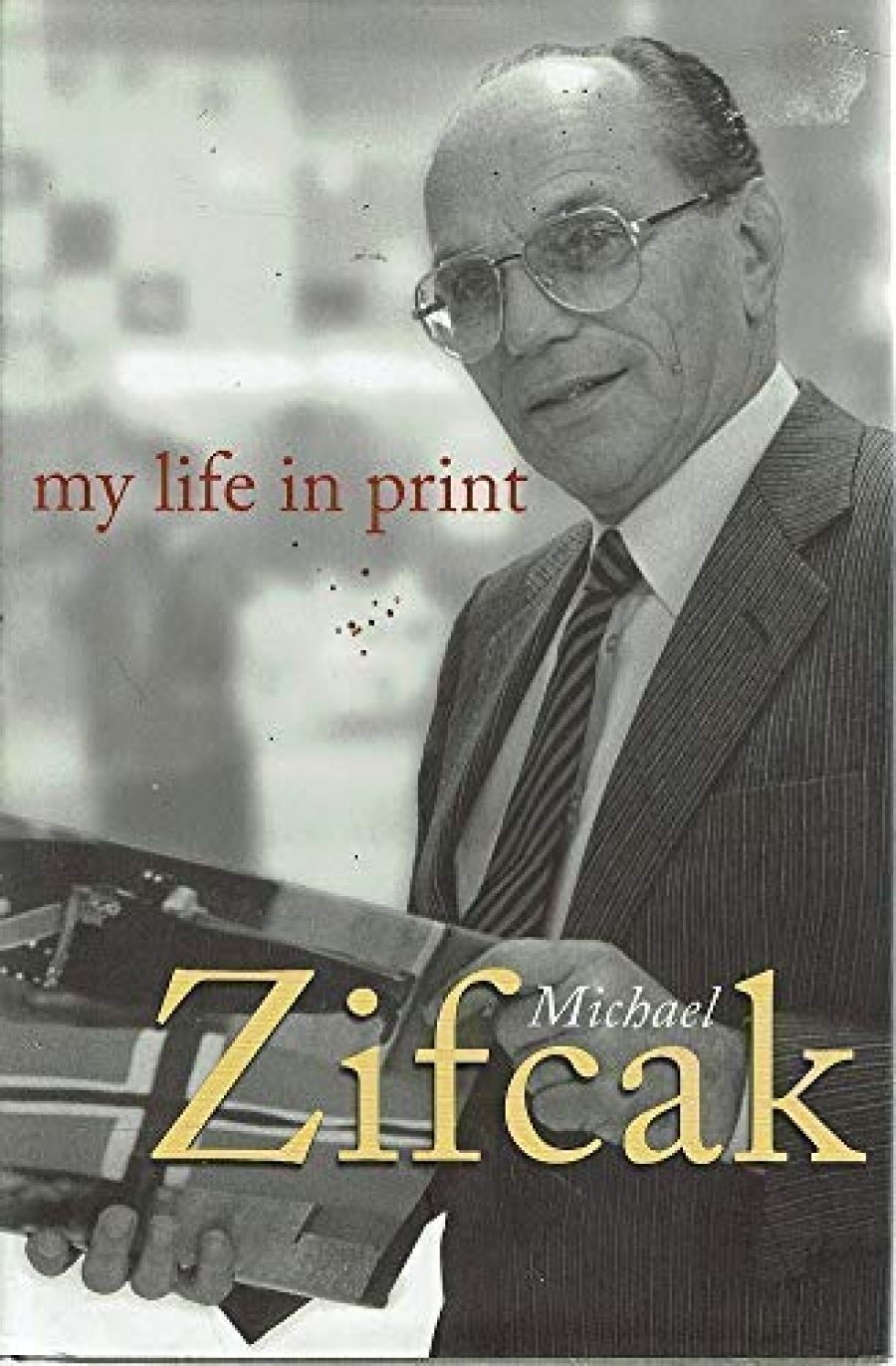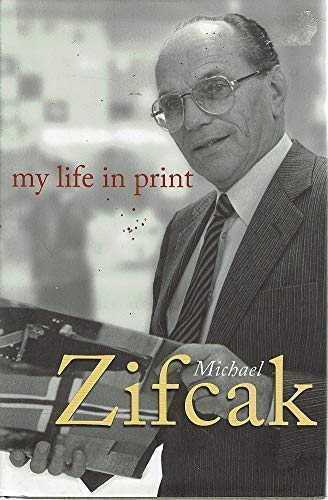
- Free Article: No
- Custom Article Title: Bratislava to Bourke Street
- Review Article: Yes
- Article Title: Bratislava to Bourke Street
- Online Only: No
- Custom Highlight Text:
So many recent books have been about failure of one sort or another that when I read Michael Zifcak’s My Life in Print, with its eminently successful life story, I was at first inclined to scan it for points of criticism. Such is human nature. There are points, of course – the book is really two quite separate texts. The first, and most compelling, is the account of Michael Zifcak as a boy in rural Slovakia, then a youth and young man of estimable drive and a sharp, organising mind, who sets himself the task of improving his life – rapidly. Through a great deal of self-study and application, he gained his accountancy qualifications and pushed himself into a key position with one of the country’s leading manufacturers (ALPA, an ‘elixir’ with impressively high alcohol content), all this during Adolf Hitler’s rise to power and the ensuing German occupation of Czechoslovakia, World War II and the postwar Soviet takeover.
- Book 1 Title: My Life in Print
- Book 1 Biblio: Lothian, $45 hb, 224 pp, 073440879X
- Book 1 Cover Small (400 x 600):

- Book 1 Cover (800 x 1200):

These episodes are recorded in clear, graphic prose, lightly related with wit, perspective and a lack of self-pity or sentimentality. Perhaps one does not really expect sentimentality from an accountant. The narrator presents clearly enough the profoundly unsettling times, the dangers, and the resourcefulness of the young man.
As well as the political and emotional highlights of these years, we are given an account of his entry into the world of business, organising and maintaining a manufacturing and distribution enterprise in increasingly difficult times. Most accounts I have read of these war years in Central Europe concentrate on personal tragedy, loss, separation and dislocation. Zifcak does not exclude similar crises (his account of sudden imprisonment is graphic, if relatively laconic), but, essentially, he places his personal life in the context of his development as a businessman. He does not hesitate to reveal his tactical ‘bribes’ of the high-alcohol product to secure his path through the red tape and corruption of the occupying forces. One is only relieved when, after the war and the later years of communism, he and his new wife finally manage to escape in 1950. They had carefully arranged to have valuable negotiable assets delivered to Vienna and Paris. They never received them. The postwar European climate had its own laws of the jungle. I think he regretted that he had no more high-alcohol bottles of liniment to open doors, for they were penniless and his wife Ludmilla was pregnant.
In 1950, after harrowing times, they decided on Australia. It seemed far from Europe, and America would have entailed a ten-year wait. In a last extraordinary scrounging for funds, they raised the cash for a cabin in a ‘luxury liner’ to Australia. They were disillusioned about the liner, but it got them to Melbourne. The future was theirs.
What most struck me in Zifcak’s account of his European years is that it prepares the reader for the energy, positive attitudes and resourcefulness he was to bring to his life as an Australian. Failure was never on the personal agenda. At least, in this account. Setbacks, yes, at various times, but foremost initiative and determination. This is nicely illustrated by his account of how he had his son, Spencer, enrolled at Melbourne Grammar School. When he learned that only the sons of ‘old boys’ were eligible, Michael Zifcak fronted up to the headmaster, then the Anglican Archbishop of Melbourne (the land was owned by the Anglican Church). He wore them all down. Nothing, as he had already discovered, is immovable.
The latter half of this book is an account of his settling into the world of Australian bookselling and the creation of a retail empire around the Hill of Content bookshop in Bourke Street, Melbourne. This part of the story is perhaps familiar but worth retelling. Michael Zifcak has been one of the remarkable figures in the book scene here. Not only in bookselling; he was active in the promotion of the book in various ways. The most notable of his projects was the formation of the National Book Council (1973–97) which was able to draw on funds from the newly formed Literature Board of the Australia Council to initiate a whole series of promotional activities, chief of which was the then-innovative NBC book awards (later called the ‘Banjos’, after Banjo Paterson) and the revival in 1978 of Australian Book Review.
This second part of My Life in Print deals primarily with professional matters. As an accountant myself, I found it informative, even intriguing. The Michael Zifcak of the Slovak years is still there, but in attenuated form. In a sense, when he first donned a business suit, back in Brno and Bratislava, he clothed himself in his future. I would have liked to see a little more of him at home, or even on a tennis court, relaxing, if that were possible.


Comments powered by CComment